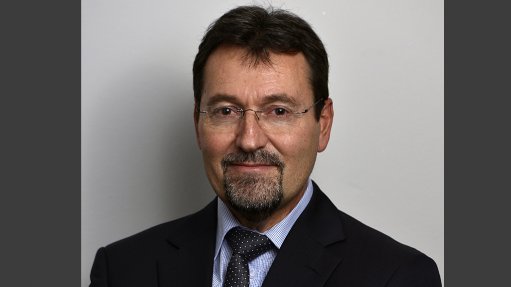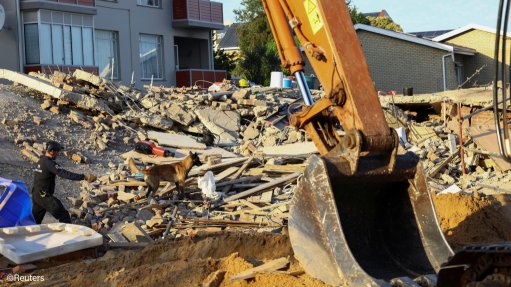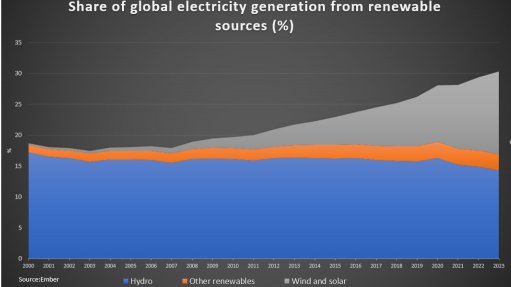Modernisation in South Africa will attract new investment, offer opportunities for industry

Boston Consulting Group (BCG) MD and partner Tycho Mőncks talks to Creamer Media's Simone Liedtke about the benefits of modernisation, and touches on the Covid-19 pandemic. Video: Recorded on Zoom. Editing: Creamer Media's Nicholas Boyd.
Demonstrating that modernisation in South Africa is possible will attract new investment and offer opportunities for the mining industry, while simultaneously promoting the country as an attractive mining investment location, says Boston Consulting Group (BCG) MD and partner Tycho Mőncks.
This continued push on the digital front has seen miners experiment with pilot projects in analytics, infrastructure and communication networks, such as working remotely, owing mostly to the Covid-19 pandemic, besides others.
Promoting modernisation, and changing the perception of it being “a killer of jobs”, will not only enable mining companies and operations to continue operating, but it will also stabilise the mining environment and increase safety for employees.
Mőncks notes that government has an important role to play in building the foundation for a stable investment environment, which he suggests can be done through basic geological mapping to confirm the country’s available resources, as well as where future potential may lie.
However, Mőncks laments that “there are some limitations” to the South African commodity portfolio, as “full transparency” is not common practice in the country.
Through basic geological mapping, and basic infrastructure, government provides an opportunity for international investors and stakeholders to launch exploration efforts, while promoting the country as a mining destination.
Considering that there is a demand for, and opportunity in, various commodities, such as iron-ore, platinum-group metals, gold and copper, mining companies currently in operation should also focus on achieving energy efficiencies, such as potentially switching from diesel-operated trucks to hydrogen-operated trucks, Mőncks suggests.
The same opportunity lies in sourcing a stable electricity supply, and while this may require discussion with State-owned power utility Eskom, Mőncks notes that “mining companies can individually and independently take steps to complement their electricity supply with renewables resources”.
This “greenification” of mining operations also helps to attract different investors, while ensuring security of operations, ultimately securing jobs while “doing the right thing” from a climate perspective.
COVID-19
The global Covid-19 pandemic, which reached South African shores almost a year ago, is also considered to be a disruptor, or accelerator, of development, says Mőncks.
“Globally, mining companies have done a good job in keeping their employees safe while ensuring their production and supply chains are as resilient as possible,” he comments, noting that the range of elements addressed before and during the pandemic, “definitely should continue”.
The Covid-specific efforts – such as wearing masks, sanitising and physical distancing, besides others – are likely to continue until a vaccine is rolled out, says Mőncks.
“Mining companies have the advantage in that they have the expertise in dealing with situations that are comparable to Covid [like HIV or tuberculosis]. This is certainly an experience and asset base that they can leverage,” he avers.
The key element here is that mining companies have health facilities and staff, as well as logistical capabilities, to assist in distributing the vaccine, especially in rural areas and communities, where mining companies often operate.
Overall, the pandemic has led to an increased focus in the environmental, social and governance (ESG) space, which Mőncks says is “essentially 'more than just the environment'”.
To this end, the mining industry has developed an increased awareness of risk management, which it will benefit from in future situations, such as natural disasters or even community unrest.
“We need to think about our own resilience and we need to make sure that we have plans in place if other disrupters happen in the future. We need to make sure that the sustainability and continuation of the operations are ensured,” Mőncks comments.
Comments
Press Office
Announcements
What's On
Subscribe to improve your user experience...
Option 1 (equivalent of R125 a month):
Receive a weekly copy of Creamer Media's Engineering News & Mining Weekly magazine
(print copy for those in South Africa and e-magazine for those outside of South Africa)
Receive daily email newsletters
Access to full search results
Access archive of magazine back copies
Access to Projects in Progress
Access to ONE Research Report of your choice in PDF format
Option 2 (equivalent of R375 a month):
All benefits from Option 1
PLUS
Access to Creamer Media's Research Channel Africa for ALL Research Reports, in PDF format, on various industrial and mining sectors
including Electricity; Water; Energy Transition; Hydrogen; Roads, Rail and Ports; Coal; Gold; Platinum; Battery Metals; etc.
Already a subscriber?
Forgotten your password?
Receive weekly copy of Creamer Media's Engineering News & Mining Weekly magazine (print copy for those in South Africa and e-magazine for those outside of South Africa)
➕
Recieve daily email newsletters
➕
Access to full search results
➕
Access archive of magazine back copies
➕
Access to Projects in Progress
➕
Access to ONE Research Report of your choice in PDF format
RESEARCH CHANNEL AFRICA
R4500 (equivalent of R375 a month)
SUBSCRIBEAll benefits from Option 1
➕
Access to Creamer Media's Research Channel Africa for ALL Research Reports on various industrial and mining sectors, in PDF format, including on:
Electricity
➕
Water
➕
Energy Transition
➕
Hydrogen
➕
Roads, Rail and Ports
➕
Coal
➕
Gold
➕
Platinum
➕
Battery Metals
➕
etc.
Receive all benefits from Option 1 or Option 2 delivered to numerous people at your company
➕
Multiple User names and Passwords for simultaneous log-ins
➕
Intranet integration access to all in your organisation



















